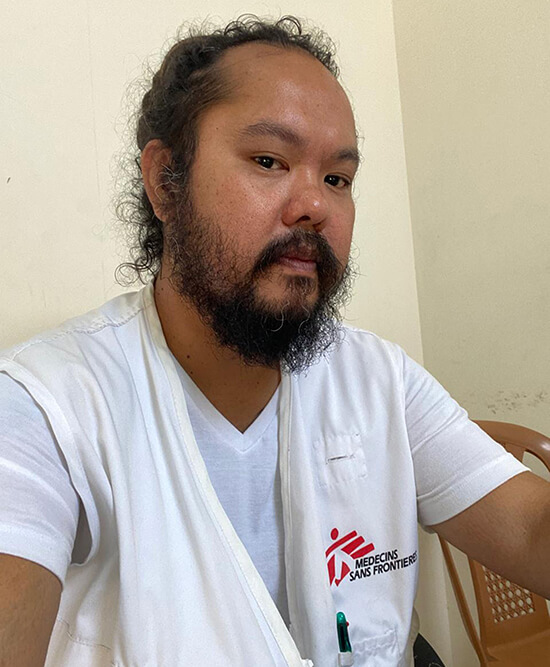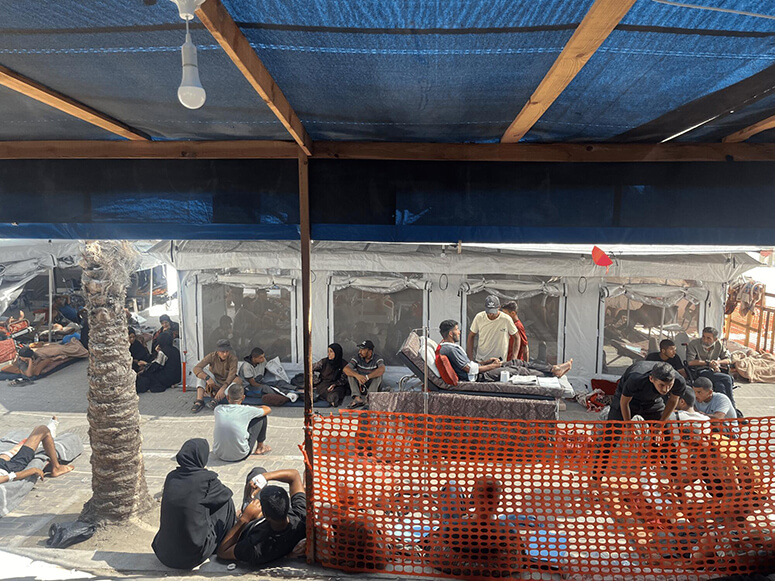A Filipino in Gaza: A story of courage and purpose
Juan Perfecto Palma thought he was prepared for it all. When he joined Doctors Without Borders in 2021, he was assigned to Ukraine. Just this May 2025, he was assigned in Gaza; he’s back in Manila, ready for assignments where health care is needed.
Palma spent two months in the Gaza Strip, the maximum duration of assignments for international mobile staff due to the high level of difficulty and the security context.
As a project medical referent, his role was to manage three health facilities run by Doctors Without Borders: one trauma and surgical field hospital with an in-patient bed capacity of 90; one primary health care center with a trauma stabilization point; and one wound dressing facility.
“When I accepted the mission in Gaza, I thought I was prepared. But then upon arrival and while I was there, I realized no one can ever be fully prepared for Gaza,” he said in an online interview.
“I knew that it would be a tough mission due to the devastation in Gaza, but being there, and experiencing, seeing, and feeling the suffering of people make a huge difference. People in Gaza have suffered too much already.”
Palma has seen some schools for children in the Middle Area of Gaza Strip where he worked. The schools resumed operations under the support of UNICEF, but classes are disrupted due to security threats.

People are hungry, he says. “No proper food supplies have entered Gaza for almost two years now. In health facilities supported by Doctors Without Borders, we have seen an increasing number of patients as well as children suffering from moderate and severe cases of acute malnutrition.
“All government hospitals and field hospitals and other health facilities supported by international NGOs are already at over-capacity and at breaking point. Our field hospitals receive patients related to mass casualty incidents almost every day. People have poor access to healthcare due to overstretched health resources.”
The situation is tough and devastating, Palma continues. “Infrastructures destroyed, hospitals at over capacity, people are hungry, poor hygiene and sanitation, no de facto government to maintain peace and order, medical and non-medical supplies are limited. Children are suffering.”

He says Doctors Without Borders teams are operating on the available but limited resources. Aside from an increasing trend of malnutrition, other activities are disrupted due to ongoing security-related incidents, Palma points out.
His message to Filipinos and to the world: “Let us all help to advocate for the urgent and pressing needs of the people in Gaza, including the international organizations providing humanitarian interventions. Let’s especially advocate for aid to enter Gaza.”
Palma, 39 years old, is a registered nurse in the Philippines. He is a project medical referent, in charge of managing the medical operations of Doctors Without Borders in a project or mission. He graduated with a BS Nursing degree from the Unibersidad de Santa Isabel in Naga City.
The native of Bicol has been doing humanitarian work for 16 years now, starting with the International Committee of the Red Cross in the Philippines from 2009 to 2021.
“Since 2009, when I first did humanitarian work, I decided that I will do this for the rest of my life,” he says. “This is my purpose in life.”
On Oct. 7, 2023, a coordinated attack was launched against Israeli civilian targets and military bases in southern Israel, near the border with Gaza.
More than 1,000 members of Hamas' military wing and other Palestinian armed groups, accompanied by Palestinian civilians, were involved, the United Nations Human Rights Council (UNHRC) reported in May 2024.
The HRC is an intergovernmental body within the United Nations system made up of 47 States, responsible for the promotion and protection of all human rights around the globe.
“According to Israeli sources, more than 1,200 persons were killed directly by members of various Palestinian armed groups and others and by rockets and mortars launched from the Gaza Strip.
“Of these, at least 809 were civilians, including at least 280 women, 68 foreign nationals and 314 Israeli military personnel. Among those killed were 40 children (including at least 23 boys and 15 girls) and 25 persons aged 80 and over,” according to the HRC.


